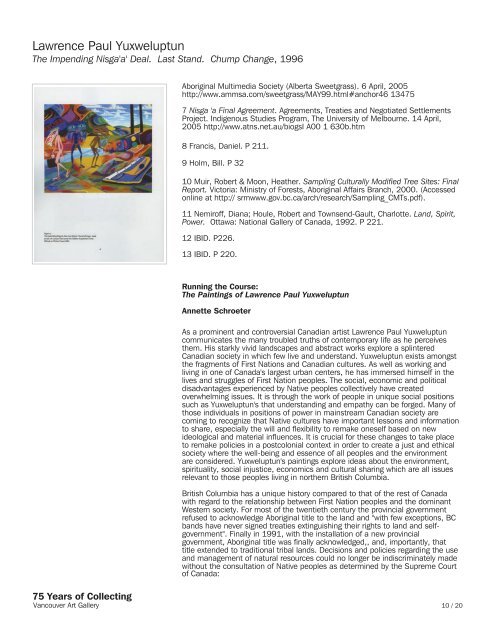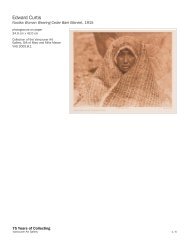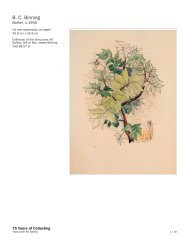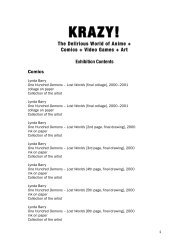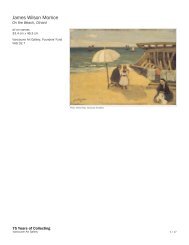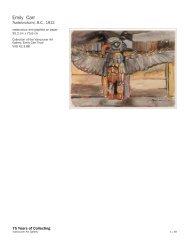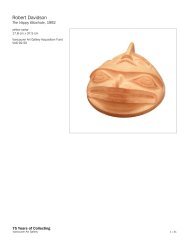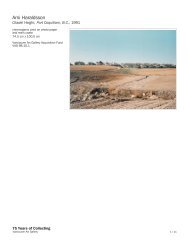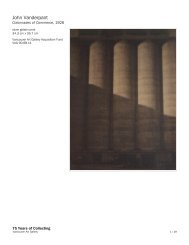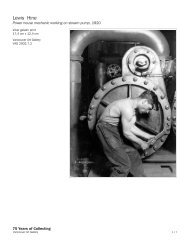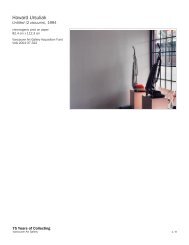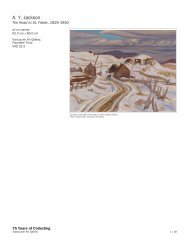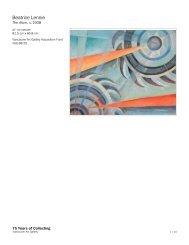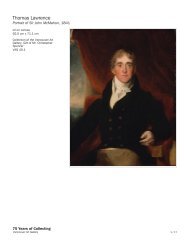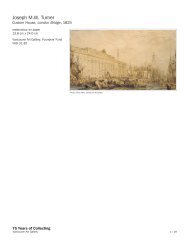Lawrence Paul Yuxweluptun - 75 Years of Collecting - Vancouver ...
Lawrence Paul Yuxweluptun - 75 Years of Collecting - Vancouver ...
Lawrence Paul Yuxweluptun - 75 Years of Collecting - Vancouver ...
Create successful ePaper yourself
Turn your PDF publications into a flip-book with our unique Google optimized e-Paper software.
<strong>Lawrence</strong> <strong>Paul</strong> <strong>Yuxweluptun</strong><br />
The Impending Nisga'a' Deal. Last Stand. Chump Change, 1996<br />
<strong>75</strong> <strong>Years</strong> <strong>of</strong> <strong>Collecting</strong><br />
<strong>Vancouver</strong> Art Gallery<br />
Aboriginal Multimedia Society (Alberta Sweetgrass). 6 April, 2005<br />
http://www.ammsa.com/sweetgrass/MAY99.html#anchor46 134<strong>75</strong><br />
7 Nisga 'a Final Agreement. Agreements, Treaties and Negotiated Settlements<br />
Project. Indigenous Studies Program, The University <strong>of</strong> Melbourne. 14 April,<br />
2005 http://www.atns.net.au/biogsI A00 1 630b.htm<br />
8 Francis, Daniel. P 211.<br />
9 Holm, Bill. P 32<br />
10 Muir, Robert & Moon, Heather. Sampling Culturally Modified Tree Sites: Final<br />
Report. Victoria: Ministry <strong>of</strong> Forests, Aboriginal Affairs Branch, 2000. (Accessed<br />
online at http:// srmwww.gov.bc.ca/arch/research/Sampling_CMTs.pdf).<br />
11 Nemir<strong>of</strong>f, Diana; Houle, Robert and Townsend-Gault, Charlotte. Land, Spirit,<br />
Power. Ottawa: National Gallery <strong>of</strong> Canada, 1992. P 221.<br />
12 IBID. P226.<br />
13 IBID. P 220.<br />
Running the Course:<br />
The Paintings <strong>of</strong> <strong>Lawrence</strong> <strong>Paul</strong> <strong>Yuxweluptun</strong><br />
Annette Schroeter<br />
As a prominent and controversial Canadian artist <strong>Lawrence</strong> <strong>Paul</strong> <strong>Yuxweluptun</strong><br />
communicates the many troubled truths <strong>of</strong> contemporary life as he perceives<br />
them. His starkly vivid landscapes and abstract works explore a splintered<br />
Canadian society in which few live and understand. <strong>Yuxweluptun</strong> exists amongst<br />
the fragments <strong>of</strong> First Nations and Canadian cultures. As well as working and<br />
living in one <strong>of</strong> Canada's largest urban centers, he has immersed himself in the<br />
lives and struggles <strong>of</strong> First Nation peoples. The social, economic and political<br />
disadvantages experienced by Native peoples collectively have created<br />
overwhelming issues. It is through the work <strong>of</strong> people in unique social positions<br />
such as <strong>Yuxweluptun</strong>'s that understanding and empathy can be forged. Many <strong>of</strong><br />
those individuals in positions <strong>of</strong> power in mainstream Canadian society are<br />
coming to recognize that Native cultures have important lessons and information<br />
to share, especially the will and flexibility to remake oneself based on new<br />
ideological and material influences. It is crucial for these changes to take place<br />
to remake policies in a postcolonial context in order to create a just and ethical<br />
society where the well-being and essence <strong>of</strong> all peoples and the environment<br />
are considered. <strong>Yuxweluptun</strong>'s paintings explore ideas about the environment,<br />
spirituality, social injustice, economics and cultural sharing which are all issues<br />
relevant to those peoples living in northern British Columbia.<br />
British Columbia has a unique history compared to that <strong>of</strong> the rest <strong>of</strong> Canada<br />
with regard to the relationship between First Nation peoples and the dominant<br />
Western society. For most <strong>of</strong> the twentieth century the provincial government<br />
refused to acknowledge Aboriginal title to the land and "with few exceptions, BC<br />
bands have never signed treaties extinguishing their rights to land and selfgovernment".<br />
Finally in 1991, with the installation <strong>of</strong> a new provincial<br />
government, Aboriginal title was finally acknowledged,, and, importantly, that<br />
title extended to traditional tribal lands. Decisions and policies regarding the use<br />
and management <strong>of</strong> natural resources could no longer be indiscriminately made<br />
without the consultation <strong>of</strong> Native peoples as determined by the Supreme Court<br />
<strong>of</strong> Canada:<br />
10 / 20


